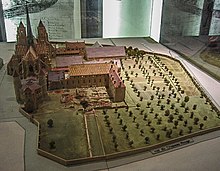Waltrich
Waltrich , also Waldrich , Waltrih or Baldric (Old High German for the rich ruler , * 8th century ; † January 16, 790 ) was a Benedictine , founder and first abbot of the Schäftlarn monastery , abbot of the Saint-Bénigne monastery in Dijon and bishop of Langres .
Live and act
origin
Waltrich came from the Franconian noble family of the Waltriche , who as illegitimate descendants of Karl Martell were closely related to the Carolingians and were particularly wealthy in the area of Langres and Dijon. From the early 8th century they came to Bavaria with the support of the Neustrian house marshals, where they married the high Bavarian noble families of the Huosi and Hahilinga .
Foundation of the Schäftlarn monastery
In 762 Waltrich donated and built it with the permission of the Bavarian Duke Tassilo III. a noble monastery on its own property ( In propria hereditate mea, in loco Peipinbach, villa nuncupata Sceftilari ) . Originally, the area around Schäftlarn was a ducal estate, but after the defeat of Duke Odilos , Tassilo's father, in the battle of Epfach am Lech against King Pippin the Younger in 743, many of the ducal estates became the property of Carolingian vassals - and so did they an ancestor of Waltrich, as the place name Peipinbach ( Pippinbach ) suggests. After the consecration of the monastery building under the patronage of the Frankish imperial saint Dionysius of Paris as well as Rusticus of Cahors and Eleutherius , Waltrich handed over the monastery along with the churches in Deining and Epolding to the diocese of Freising - a very unusual process according to the customary early medieval monastery founding. The foundation of his monastery founding is probably due to Waltrich's efforts to rise to higher dignities within the Frankish imperial aristocracy - this finally succeeded in 778, when Waltrich was appointed Bishop of Langres after the abdication of Hariolf and thus also an important spiritual and political position in the captured the Frankish empire. The fact that Waltrich immediately dedicated the founding of the monastery in Schäftlarn to the Franconian Saint Dionysius allows the conclusion that he was in direct contact with Fulrad , the abbot of Saint-Denis , who, as King Pippin's most important advisor, supported the Franconian influence in southern Germany with church resources . This is all the more likely as Waltrich's relative and predecessor in Langres, Hariolf, the founder of the Ellwangen monastery , was a close colleague of Fulrad. Despite his donation of the Schäftlarn Abbey to the Freising diocese, Waltrich remained abbot and head of the monastic community in the monastery he founded until his death.
Bishop of Langres and Abbot of the Saint-Bénigne Monastery
In addition to the dignity of abbot in Schäftlarn, Waltrich was appointed bishop of the diocese of Langres around 775 by the Frankish King Charlemagne . There he succeeded his relative Hariolf, who had resigned from office in the same year in order to retire to the Ellwangen Monastery which he founded. Since the early Middle Ages, all the bishops of Langres took their official residence in Dijon and at the same time in personal union initiated the local monastery convent of Saint-Bénigne, Waltrich took consequently the office of chief monastery in Dijon. In 775 Waltrich appears for the first time in documents as abbot of the Saint-Bénigne monastery in Dijon. He followed there as the 20th abbot of the monastery, which was consecrated in memory of Saint Benignus of Dijon and founded around the year 535, after Hildebrannus, mentioned by name only twice in the written traditions . So he was at the same time head of two monasteries in the Franconian Empire, namely in West Bavaria and Burgundy . Since the Waltriche had a wealthy property in the Dijon area since the beginning of the 7th century, the election of Waltrich as head of the Abbey of Saint-Bénigne in the sense of the Carolingian policy for the targeted filling of important ecclesiastical offices by members of close families seems only logical; the accumulation of clerical offices corresponded to the usual customs of church policy in the Franconian Empire at that time. Waltrich held the office of abbot until his death in 790 - he was succeeded by Apollinarius, a Benedictine who, like himself, held other abbots in addition to the monastery of Saint-Bénigne: those of the abbey of Flavigny and the monastery of Réome.
Successor in Schäftlarn and Langres
After Waltrich's death in 790, the offices of abbot in the Schäftlarn monastery and the episcopal dignity in Langres were transferred to his relative Petto .
literature
- Wilhelm Störmer : Schäftlarn, Murrhardt and the Waltriche of the 8th and 9th centuries , in: Journal for Bavarian State History , No. 28, 1965.
- Romuald Bauerreiß : Old Bavarian Hachilingen as bishops of Langres in Burgundy. A contribution to the early history of Schäftlarn , in Bayerische Benediktinerakademie (Ed.), Studies and Communications on the History of the Benedictine Order and its Branches , Volume 75, 1964, pp. 254-261. available online
- Émile Bougaud & Joseph Garnier: Chronique de l'abbaye de Saint-Bénigne de Dijon, suivie de la chronique de l'abbaye Saint-Pierre de Bèze , éd. Darantière, Dijon, 1875.
| predecessor | Office | successor |
|---|---|---|
| --- |
Abbot of Schäftlarn 762–790 |
Petto |
| Hildebrannus |
Abbot of Saint-Bénigne 775–790 |
Apollinarius |
| Hariolf |
Bishop of Langres 775–790 |
Petto |
| personal data | |
|---|---|
| SURNAME | Waltrich |
| ALTERNATIVE NAMES | Waldrich; Waltrih; Baldric |
| BRIEF DESCRIPTION | Benedictine, founder and first abbot of the Schäftlarn monastery, abbot of the Saint-Bénigne monastery in Dijon and bishop of Langres |
| DATE OF BIRTH | 8th century |
| DATE OF DEATH | January 16, 790 |

